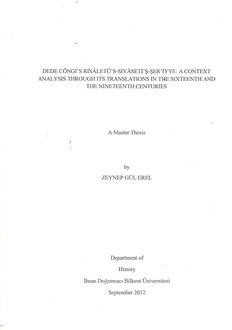Dede Cöngi's Risâletü's-Siyâseti'ş-Şer'iyye : a context analysis through its translations in the sixteenth and the nineteenth centuries / Zeynep Gül Erel ; [thesis supervisor Eugenia Kermeli Ünal].
Yer Numarası
B.I/7473
Dil Kodu
İngilizce
Yazar
Yayın Bilgisi
2012.
Fiziksel Niteleme
vii, 178 y. ; 29 cm
Tez Notu
Tez (Yüksek Lisans) -- İhsan Doğramacı Bilkent Üniversitesi Ekonomi ve Sosyal Bilimler Enstitüsü Tarih Ana Bilim Dalı, 2012.
Bibliyografi, vb. Notu
Bibliyografya y. 168-178.
Özet, vb.
► Bu tez, 16. yy âlimlerinden Kemalüddin İbrahim bin Yahşi, daha çok bilinen ismiyle Dede Cöngi Efendi'nin, "Siyasetname" olarak da anılan, dili Arapça olan Risaletü's-Siyasetü'ş-Şeriyye'yi incelemektedir. Yazıldığı yüzyılda hangi amaca hizmet ettiği ve mevcut çevirilerine rağmen, klasik dönem Osmanlı Devleti yönetim anlayışını yansıtan bu eserin Arapça'dan Osmanlıca'ya 19.yy'da Şeyhülislam Meşrebzade Arif Efendi tarafından tekrar çevrilmesinin sebeplerini araştırmaktadır. Bilinen üç çevirisi olan bu eserin, öncelikle yazıldığı yüzyılda içeriği itibariyle hangi siyasi ortamda ortaya çıktığı ve hangi akademik tartışma ortamında doğduğu tartışılmış, daha sonra, metnin çevirileri ve orijinalini içeren bir karşılaştırma yapılmıştır. Metnin, siyasetin meydana getirilmesinde örf ve Şeriat etkileşimi tartışmasına nasıl yaklaştığı araştırılmış, daha sonra 19. yy'da Meşrebzâde tarafından yapılan yorumlu çevirisine dayanarak, dönemin hukuki reformları çerçevesinde nasıl araçsallaştırıldığı tartışılmıştır.
► This thesis intends to analyze the manuscript of the 16th Century scholar, müderris Kemalüddin İbrahim bin Yahşi, Dede Cöngi Efendi's Risaletü's-Siyasetü'ş-Şeriyye ; which is also known as "Siyasetnâme". The main purpose of such text which reflects Ottoman State's perception of administration in classical age was discussed. Moreover, Şeyhülislam Meşrebzâde Arif Efendi's motivation of re-translating and interpreting this text despite the presence of several translations from Arabic to Ottoman Turkish is reviewed. First of all, the political context and academic discussions in which this text emerged is observed. Prior to a comparison between the original text and translations, the manuscript was analyzed in the own historical context. The text's aspect of siyâsa is observed considering its affiliation to the discussion of örf and Shari'a. Lastly, the reasons for the emergence of an interpretation of the text by the highest level ulema member, Şeyhülislam, in the 19th Century were argued in addition to a discussion on how this text was utilized in the context of legal reforms in Ottoman Empire.
► This thesis intends to analyze the manuscript of the 16th Century scholar, müderris Kemalüddin İbrahim bin Yahşi, Dede Cöngi Efendi's Risaletü's-Siyasetü'ş-Şeriyye ; which is also known as "Siyasetnâme". The main purpose of such text which reflects Ottoman State's perception of administration in classical age was discussed. Moreover, Şeyhülislam Meşrebzâde Arif Efendi's motivation of re-translating and interpreting this text despite the presence of several translations from Arabic to Ottoman Turkish is reviewed. First of all, the political context and academic discussions in which this text emerged is observed. Prior to a comparison between the original text and translations, the manuscript was analyzed in the own historical context. The text's aspect of siyâsa is observed considering its affiliation to the discussion of örf and Shari'a. Lastly, the reasons for the emergence of an interpretation of the text by the highest level ulema member, Şeyhülislam, in the 19th Century were argued in addition to a discussion on how this text was utilized in the context of legal reforms in Ottoman Empire.
Dil Notu
İngilizce özet y. iii.
Türkçe özet y. iv.
Türkçe özet y. iv.
Konu
Emeği Geçenler
Ünal, Eugenia Kermeli, Dr., tez danışmanı.


